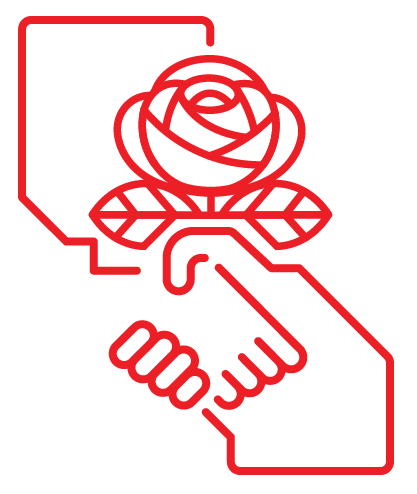EWOC: The Santa Cruz connection
Every Monday, a small group of organizers gathers in a brightly lit printmaking studio in Santa Cruz. Sometimes we are joined by groups of workers who are trying to organize their workplaces. Other weeks we are more focused on struggles within our own unions, or on assembling materials for outward facing events and strike support. But the thing that binds our group—the practice that gives us continuity of purpose through the ups and downs of organizing in a company town dominated by the University of California—is the slow and steady spadework of new worker organizing as a newly formed local of the Emergency Workplace Organizing Committee (EWOC).
EWOC, a joint project of DSA and the United Electrical Workers Union, was formed at the start of the pandemic as a sort of hotline for workers in unorganized shops dealing with the new challenges of the pandemic (as well as the perennial challenges of selling one’s labor power in late capitalism.) Since 2020, it has grown into a network of hundreds of organizers across the country that provides training and resources to workers who want to do everything from advocate for greater safety in the workplace to form recognized unions.
At any given time, EWOC organizers around the country are plugged into something like 250 different shops in various stages of issue and union campaigns. Locally, we have half a dozen workplaces we are assisting. It is unquestionably a successful project, and a not insignificant part of labor’s notable, if tentative, resurgence in the 2020s. A clear sign of the success of EWOC is the fact that at the last DSA convention, which was marked by all kinds of controversy and disagreement over strategy, an amendment to support EWOC by encouraging the formation of local EWOC chapters was the most widely supported thing the convention passed, garnering 96% support and uniting DSAers across all caucuses and tendencies. DSAers disagree on strategy at all levels, but it is hard to oppose a project that has quietly been delivering wins to workers in small and large shops across the country.
Santa Cruz DSA answers the call
In the wake of the convention, DSA Santa Cruz answered this call for local EWOC formation by repurposing our Labor Working Group (LWG) into just such a body. Half of our core members took EWOC’s foundational training course and were onboarded to the program. Since then, the work of managing EWOC cases has given us a consistent practical activity and we have taken on shops as small as 15 workers and as big as a thousand. As a medium-sized chapter with limited capacity, EWOC has given us a sense of focus and an endless well of projects, and could serve as a model for other small and medium sized chapters that have had trouble finding an orientation in labor work.
This has not been without challenges. First, because Santa Cruz is a small town, the majority of the cases that EWOC has sent our way have been out of our region. In a Zoom world this isn’t a huge obstacle, but it does mute some of the value of being a “local” chapter able to mount strong community support campaigns. That said, the ethos of EWOC is that it is the workers themselves, rather than community support, that matters in the last instance. Our members are helping workers at tech companies with international workforces, large factories in Oregon, and small shops in Chicago. Given this range, the ability to have a regular, weekly check-in with one another about the challenges we are encountering has been invaluable, and a crucial supplement to the national structure of EWOC.
A disciplined meeting structure
A further challenge we face is that by taking on EWOC cases as the core of our Labor Working Groups activity, it has made it difficult to integrate new people interested in labor work into the work of our group. Oftentimes we are so focused on the particular cases we are supporting that it can be hard for people not already onboarded to EWOC to engage in our working group’s projects, leading to some folks bleeding away. To address this, we have found it important to develop a disciplined meeting structure that makes sure that the check-in about cases doesn’t completely displace more accessible projects for non-EWOC organizers. This may not be a huge problem for chapters large enough to field separate EWOC locals and DSA labor formations, but in a place like Santa Cruz, the imposition of a rigid meeting structure with space for both EWOC coordination and other work has helped us create a labor organizing space that feels both accessible and purposeful. In fact, becoming an EWOC local has actually been the catalyst to developing this more purposeful structure.
The socialist left in 2024 faces myriad challenges, and any hope we may feel is connected to the upsurge in organizing that is only taking its tentative first steps. But at the heart of every goal we may set for ourselves has to be the project of reversing the decades-long dis-organization of the working class wrought by neoliberalism. The slow, careful work of forming the connective tissue between workers, of finding ways that socialists can help in the project of working class composition, is the challenge of our time and EWOC is an important element of that project. It has provided DSA Santa Cruz with a crucial orientation in these disorienting times and it should be a model for other chapters looking to ground their labor work.

